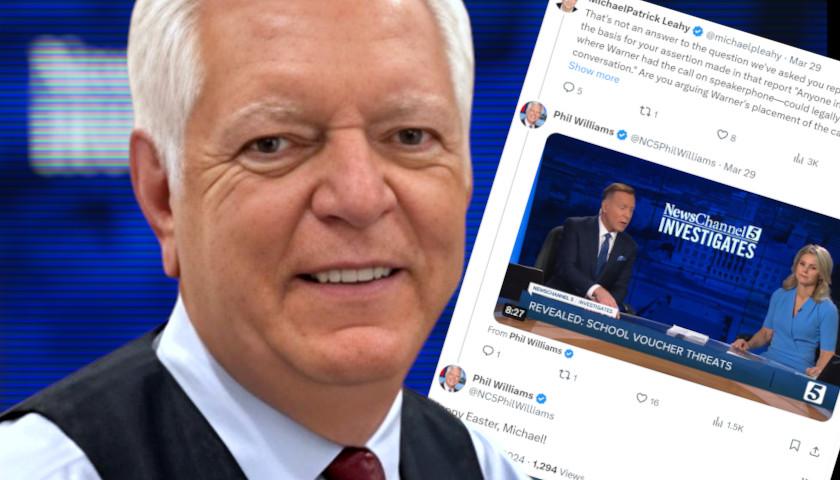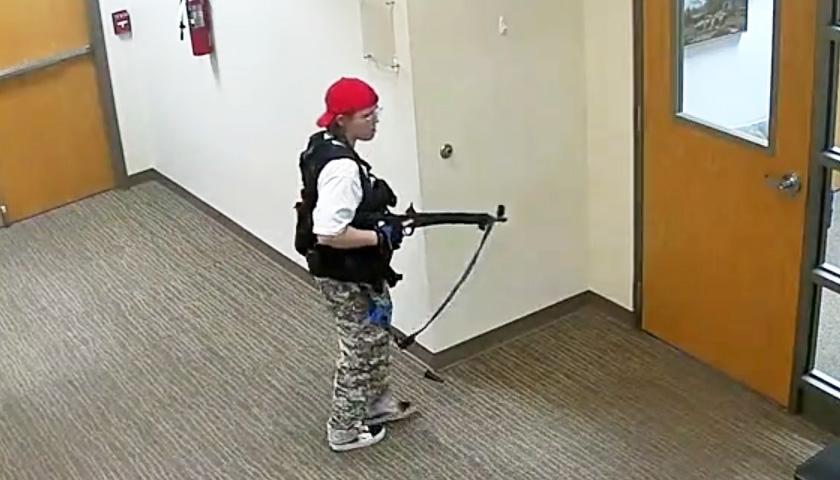Live from Music Row Thursday morning on The Tennessee Star Report with Michael Patrick Leahy – broadcast on Nashville’s Talk Radio 98.3 and 1510 WLAC weekdays from 5:00 a.m. to 8:00 a.m. – host Leahy welcomed Tennessee State Representative (R), Chris Todd of Jackson, to the studio to discuss his resolution that would result in constitutional amendment giving workers the freedom to not be mandated to join a union.
Leahy: In the studio with us state representative Chris Todd from Jackson. Chris. You have a resolution, a very important one for a state Constitutional Amendment about the right to work. Tell us about that. What is it? Why is it important? Where is it going?
Todd: A citizen’s right to work without being under the command if you will and an obligation to pay union dues is enshrined in our law. And we want to firmly plant that in our constitution so that it would be very difficult to ever be repealed and it would also be a significant pushback against the federal overreach.
And we know right now the liberals in Washington are trying to pass the Pro Act which will basically attempt to do away with our state laws dealing with right to work and force every worker in our state that is in a union shop to have to pay union dues and belong to that union and support their liberal ideas.
Leahy: The Supreme Court ruled on this and said, they can’t do that. And so they know that trying to create a federal statute to force union membership. That sounds very unamerican. But everything that the Democrats in Washington are doing seems to be unAmerican. This is a smart resolution it seems to me because it’s a statute but this will make it even stronger by making it a constitutional amendment.
Todd: Absolutely.
Leahy: Tell us about that process. Where this is in that process? How does the process work?
Todd: It’s a two General Assembly process. We passed this last year in the House and Senate. This year it has a higher bar in both the House and Senate to pass has to be a two-thirds majority.
Leahy: So let me step back. In order to get a constitutional a proposed constitutional amendment on the ballot for ratification by voters it has to go through a two-step process.
Todd: Yes. Two separate general assemblies.
Leahy: Okay, and so in the first one, it’s just needs a majority vote?
Todd: That’s correct.
Leahy: So that one needs a two-thirds vote. Where are we in that process?
Todd: The Senate has passed it. They’ve already finished their business on this particular resolution.
Leahy: It was a more than two-thirds vote?
Todd: Yes, and then I’m working this through the House. I’ve gotten it to a matter of fact this morning. It’ll be on the calendar and rules to be set for him to be heard on the house floor next week. I take that back. I’m mixing this up with my other bill. It’s going through the committees and has gone through the first committee process and we’ll go to another committee. And then when it comes to the House floor will need a two-thirds majority. And then it’s set for the next gubernatorial election, which will be in the fall of 2022. It’ll be on the ballot for the citizens of the state to make the decision.
Leahy: So that would be November of 2022.
Todd: Yes.
Leahy: The governor does not need to sign these resolutions. Is that correct?
Todd: I believe that’s correct.
Leahy: I love this about the way our constitutions are designed. State legislatures on their own have great powers. Have great powers. And this is I think a very smart exercise of those powers.
Todd: Entrusted by the people. And again, we have to be very close to the people running every two years in the house You never get away from the people. And that’s the beauty of this. You have to stay in touch with the people and know what their feelings are and know what their concerns are. And then you put the power in their hands not only from an election standpoint but then from this standpoint to amend their constitution, I mean it is ingenious.
Leahy: There’s a good likelihood that it will make it to the floor for a vote and it’s a good likelihood that it will receive the required two-thirds majority.
Todd: I would say so.
Leahy: So then it’s framed in an amendment for the ballot, right? It’s a proposition that is put on the ballot. And then voters will have in November of 2022 the opportunity to vote for or against it.
Todd: That is correct.
Leahy: Let me just summarize it. This is a constitutional amendment for the state of Tennessee which proposes adding a provision establishing the right to work regardless of status of affiliation with any labor union or employee organization. Now if this makes it on the ballot, I’m going to vote for it. What’s gonna happen? Do you anticipate that if it makes it on the ballot will the left-wing billionaires from California and Illinois and New York and all those states that are crashing and burning, will they put a big campaign on it to try to get voters to reject it?
Todd: I’m sure there will be an effort. I’m sure there will be a concerted effort by the labor unions primarily to thwart this because this is their lifeline. money is their lifeline. They live and breathe it. And it’s all about collecting those union dues. That’s their whole interest completely. This is already a law in the state. One of the arguments are in committee is that this may damage our efforts in my area to attract businesses or two for businesses to expand that are already labor union shops.
And we’ve already got the law on the books. It’s not prohibiting anybody right now. They’re coming to the state. businesses as you know are flocking to this state because of the climate that over the last 10 or 11 years the conservative General Assembly has crafted and set forward such a great economy and a great working condition for this state. We’re very attractive as you had other guests on this weed from California and other places. It’s just it shows exactly what the results are when you have the conservative ideas work and prosper in a state.
Leahy: So once it was before one of the committees that was arguing against this was making that argument.
Todd: It was a member.
Leahy: A member was making that argument. Democrat or Republican.
Todd: A Democrat.
Leahy: I’m shocked! I’m shocked! That it was a Democrat making that. so let me just say this for the record. If there is a business out there anyone in the United States listening to this program and you are deciding not to come to Tennessee because you don’t like our right-to-work laws. I say good riddance, stay away. Don’t take your bad stupid defective ideas and bring them to Tennessee.
Todd: Absolutely. We have unions in Tennessee. And a lot of places they are free to organize. They are free to work their contracts with the employers. some employers even invite them. That’s just their business model. perfectly fine. We don’t have a thing against. that we just feel like it’s the citizens right not to belong to that organization. It’s no different than if we passed a law saying every citizen had to belong to the Rotary Club for some reason. That’s not our authority or place. We need to protect citizens’ rights not to belong to those groups.
Leahy: Yeah, it’s sort of interesting. It does segue a little bit into this idea of who runs Tennessee. Do Tennesseans run Tennessee? Oh do or do Fortune 500 companies run by people who are pretty woke? Who runs Tennessee?
Todd: We the people.
Leahy: I think we the people should I like that. I like that a lot. People talk about well, we’ve got to attract new businesses. I don’t think we need to do anything to attract them more beyond what we do right now. Low regulations low state income taxes. No state income taxes on a personal basis. None. Zero, zip, nada.
Todd: Yep, and we’re cutting more taxes. I mean we’ve cut 675 million dollars in taxes on the citizens of this state since 2011.
Leahy: Look, the Democrat who made that argument to me, that’s another reason to vote for it. It will keep out these Fortune 500 companies that don’t like what we do here.
Todd: Absolutely.
Leahy: Or their divisions there of. Well, look, I think this is fantastic. I’m delighted to have you in here. How much longer do you anticipate this session of the Tennessee General Assembly will continue. We’re March 11 today.
Todd: It’s hard to predict. It’s always hard to predict in any given year. This year’s a little more unusual for a couple of reasons with the week that we had to take off for snow and ice. That was quite unusual because of travel. And being the start of a general assembly it sometimes takes a little longer. I’m expecting at least the end of April. I really think it’d probably be the middle of May. Although the Senate has already talked about closing committees the end of this month, which is got a lot of people scrambling to get good legislation through. But that’s just a guess right now.
Leahy: That makes sense to me. And it’s so in terms of life, you know, April end of April beginning May? Then you go back. You’re running your business and you don’t come back again unless it’s a special session till January?
Todd: Correct. Which during my term already I’ve had three special sessions.
Leahy: There you go. There you go. State Representative Chris Todd, it’s great having you in here.
Todd: Good to be with you.
Leahy: And come back next month sometime. Give us an update just before we close out and give us the final report on how well the Tennessee General Assembly did during this session. I think it’s doing a lot of good stuff.
Todd: I think so, too. We’ve got a lot of good ideas. I’m working on some legislation for retired police officers.
Leahy: And so there are some good things. We are going to talk about that next time state representative Chris Todd. Thanks for joining us. I hope you have a great day.
Listen to the full third hour here:
– – –
Tune in weekdays from 5:00 – 8:00 a.m. to the Tennessee Star Report with Michael Patrick Leahy on Talk Radio 98.3 FM WLAC 1510. Listen online at iHeart Radio.









The right-to-work-for-less laws are really a plot by a few business owners and plutocrats to keep their employees underpaid and overworked so that they cannot adequately support their families.